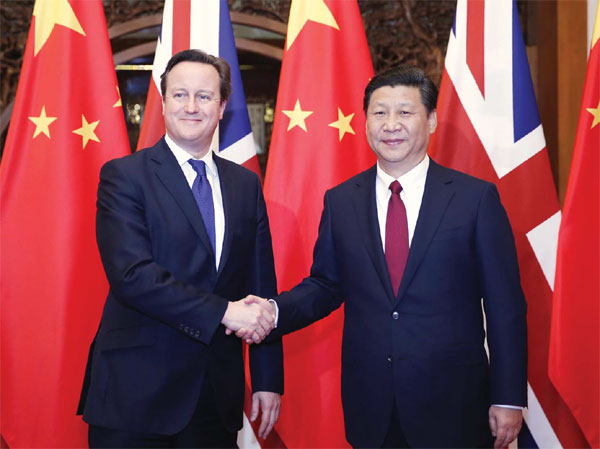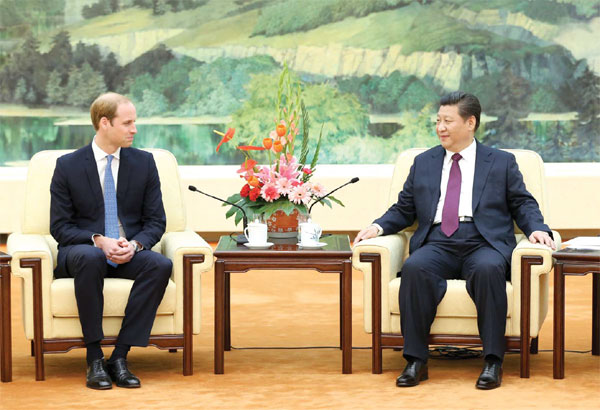Joining hands in business and culture

After 43 years of full diplomatic ties, China and Britain are entering a "golden era of relations", with trade, investment, culture and education exchanges all on the rise, according to analysts. Leaders in both countries have used the term, including British Prime Minister David Cameron in his Chinese New Year speech this year, in which he predicted greater cooperation over the next five years.
President Xi Jinping's visit, from Oct 19 to 23, will be the first by a Chinese president in 10 years. In March, Prince William, the Duke of Cambridge, visited China carrying an invitation to Xi from his grandmother, Queen Elizabeth II. It was seen as the most important royal visit to China in nearly 30 years.
But what exactly does this mean for the countries and their people?


| President Xi Jinping meets with British Prime Minister David Cameron in Beijing in December 2013. Xi arrives in London on Oct 19. Xinhua |
From a business perspective, industry experts say this signals a common interest in increased bilateral trade and more employment opportunities, stimulating further recovery in the British economy.
"The UK's trading partnership with China is of critical importance to our economic future," says Simon Moore, international director of the Confederation of British Industry, the UK's top business lobbying organization. "President Xi's state visit is a timely sign of the ever-deepening importance of that relationship, and will help further strengthen the trading bonds that link our two countries."
The nations already have strong trade links. China is Britain's fourth-largest trading partner. Britain is China's second-largest trading partner in the European Union.
According to the Chinese embassy in London, bilateral trade quadrupled between 2004 and 2014 from $19.7 billion to $80.9 billion. China-UK trade in goods totaled $36.74 billion in the first half of this year.
By last year, Britain's car exports to China had increased sevenfold since 2009, according to the British Society of Motor Manufacturers and Traders.
Bilateral investments also have boomed. By the end of last year, British direct investment had reached almost $20 billion in China with over 7,000 projects. Britain is the EU's second-largest direct investor in China. "The UK is the top destination for Chinese foreign direct investment in Europe," the CBI's Moore says.
China has invested more than $40 billion in Britain, according to the Chinese embassy. It went from $100 million in 2004 to more than $7 billion in 2014.
"Projects cover a wide range of economic fields, from infrastructure, commercial property, brand networks to research and development centers and high-end manufacturing," says Liu Xiaoming, China's ambassador to the UK.
More than 500 Chinese companies have businesses in the UK and, according to the UK Department of Trade and Industry, Chinese investment created more than 6,000 jobs in Britain during the 2014-15 budget year, ranking fourth among all foreign countries.
Telecoms giant Huawei Technologies, which opened its first office in the UK in 2001, contributed 956 million pounds ($1.4 billion; 1.3 billion euros) to GDP in the UK. It has supported 7,400 jobs directly and through its supply chain in the past three years, according to a report published in June by Oxford Economics, a British think tank.
Many Chinese companies are harnessing Britain's resources, industrial know-how and technology to produce quality products in the UK.
Zhejiang Geely Holding Group, which bought the iconic London Taxi Co in 2013, announced this year that it would invest 250 million pounds in a new facility.
"The investment is to develop and produce the next-generation, ultra-low emissions London black cab. We expect to generate up to 1,000 new jobs," says Li Shufu, founder and chairman of Geely.
Britain was also the first major country to agree to a currency swap with China, signing a deal last year worth 200 billion yuan ($31.5 billion).
Overall renminbi trading volumes in London rose 143 percent last year compared with 2013 as average daily volumes reached $61.5 billion, according to the City of London Corp.
In another sphere, hundreds of joint education programs, tourism promotions and cultural activities have brought Chinese and Britons closer on a personal level.
More than 150,000 Chinese students were enrolled at British schools and colleges last year, while in China, UK schools are running nine joint education institutions and 235 education projects.
The number of Chinese tourists last year was 230,000, and could reach 650,000 by 2020, according to British estimates.
"Chinese visitors have very positive perceptions of Britain. They already stay longer here than in our European competitor destinations and are high spenders," says Sally Balcombe, CEO of VisitBritain. "We aim to double the current annual expenditure in the UK by Chinese visitors to 1 billion pounds a year within the next five years."
So how might Xi's visit help cement a golden era in Sino-British relations?
Nathanael Ming-Yan Wei, the first British-born person of Chinese heritage to become a member of the UK's House of Lords, says the trip would "galvanize trade, cultural exchange and dialogue" and take them to new levels.
"There are also many opportunities to cooperate on the global stage diplomatically: Fighting terrorism, safeguarding waters, maintaining peace in areas of potential conflict and providing assistance to help poorer regions develop infrastructure and tackle poverty," he says.
British media have reported that the Chinese president was expected to sign an agreement while in London that would firm up cooperation in nuclear energy. The deal could see Chinese companies build a reactor near a decommissioned plant in Essex in the southeast, which would be the first Chinese-designed and operated nuclear facility in a developed Western nation, according to the reports.
"Britain needs to deliver a fleet of new nuclear stations and it's vital we attract investors from around the world," says John Hutton, chairman of the Nuclear Industry Association. "China is a global leader in nuclear power and can bring expertise and capability of great value to Britain."
The Chinese nuclear plant design is expected to be capable of producing 1 gigawatt of electricity - enough to satisfy the needs of a million British households.
While some residents and politicians have protested the plans over concerns about the safety of China's nuclear technology, Fu Xiaolan, director of the University of Oxford's Technology and Management Centre for Development, says the cooperation was mutually beneficial.
In general, she says: "China and Britain can realize a strong union and become good partners." She says the governments were taking a "positive and pragmatic approach" regarding each other's national interests.
Wei adds: "Healthy progress has been made diplomatically and commercially over the past few years between our two countries. As China seeks to transition dramatically to a more sustainable, advanced and consumer-led economy, Britain has an opportunity to share its know-how and world-class services skills and content in areas as diverse as media, sport, leisure, hospitality, research, finance and education."
Tim Summers, a senior consulting fellow at London think tank Chatham House, says changes in global economic and commercial interactions also provide opportunities for Beijing and London such as those resulting from the Belt and Road Initiative, which aims to improve China's connectivity with Europe, Asia and Africa.
Britain also should play a prominent role in the Asian Infrastructure Investment Bank, which was established this year and could aid this connectivity, he says, adding that British companies were already looking to engage with Chinese counterparts in third markets.
Liu, the Chinese ambassador, says Xi's visit to the UK would see the countries' leaders "map out a long-term development blueprint for bilateral ties, which will further deepen Sino-British cooperation and make our comprehensive strategic partnership stronger and more substantial".
More mature and stable relations would bring tangible benefits to both nations and contribute to world peace and development, he says.
Contact the writers at zhangchunyan@chinadaily.com.cn and cecily.liu@chinadaily.com.cn
| President Xi Jinping meets with Prince William, Duke of Cambridge, at the Great Hall of the People in Beijing in March. Xinhua |
(China Daily European Weekly 10/16/2015 page4)
Today's Top News
- Japan tempting fate if it interferes in the situation of Taiwan Strait
- Stable trade ties benefit China, US
- Experts advocate increasing scope of BRI to include soft power sectors
- New engine powers cargo drone expansion
- China to boost green industry cooperation
- Manufacturing PMI rises in November
































